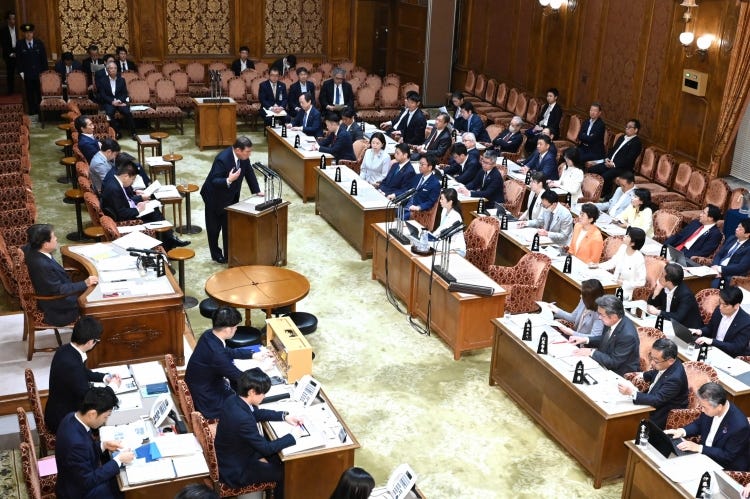Ishiba's Grecian Turn
Not for the first time, a prime minister looks to Greece to warn of fiscal collapse
Thank you for reading Observing Japan. This post is available to all readers.
If you are looking for timely, forward-looking analysis of the stories in Japans’s politics and policymaking that move markets, I have launched a new service through my business, Japan Foresight LLC. For more information about Japan Foresight’s services or for information on how to sign up for a trial or schedule a briefing, please visit our website or reach out to me.
I will also hold a monthly call for paid subscribers in the coming weeks. Stay tuned for more information about how to join.
I joined Bilal Hafeez on the Macro Hive for a conversation about major issues in Japanese politics and my career as a Japan watcher.
I also joined Bloomberg’s “The Asia Trade” to discuss the outlook for the next round of US-Japan trade talks.

In the spring of 2010, Kan Naoto, first as finance minister in the Hatoyama cabinet and then as prime minister, had an urgent warning for the Japanese people.
“Some people say that in a year or two we could end up like Greece,” he said, for example, in Osaka on 24 June at the start of that year’s upper house campaign. “I don’t want to raise taxes, but we must avoid [fiscal collapse].”1
It was this fear that undergirded his pledge to raise consumption taxes in 2010, which, to make matters worse, he abandoned after he faced pressure from the Democratic Party of Japan’s (DPJ) ranks backbenches. Kan’s willingness to campaign on a tax hike and his unwillingness to defend his position under pressure from his own party all but doomed the DPJ in that year’s upper house election. The party lost control of the upper house, complicating its management of the Diet and, ironically, opening the way for the 2011 tripartite agreement between the Noda Yoshihiko-led DPJ, the Liberal Democratic Party (LDP), and Kōmeitō to raise the consumption tax from five percent to ten percent.

It is hard not to be reminded of Kan’s folly – which he himself admitted in remarks in 2023 – when Prime Minister Ishiba Shigeru, trying to hold the line against calls to cut the consumption tax, again pointed to Greece as a cautionary tale for Japan. In questioning in the upper house’s budget committee, saying, “We are now in a world with interest rates, and Japan's fiscal situation is worse than Greece’s. Tax revenues are increasing, but social security costs are also increasing.” He appeared to be referring to Greece’s public finances today – Greece’s gross debt-to-GDP ratio is in fact slightly better than Japan’s, according to IMF data – but it is hard to miss to the use of Greece to warn the public that if Japan does not pursue fiscal sustainability, it could face the economic, social, and political crisis that followed from Greece’s debt crisis in the 2010s. Greece was not the only foreign example he used – he also referenced the “Truss shock” regarding the dangers of unfunded tax cuts – but Ishiba’s invoking of the Grecian example suggests that it continues to have a particular salience in Japan’s fiscal politics.
Whether Ishiba’s doomsaying is merited, it is clear that, having ruled out a consumption tax cut despite pressure from within the LDP, polls showing that the public is overwhelmingly in favor of a consumption tax cut, and the opposition parties competing to offer the most enticing consumption tax cut, it may be the only choice available to Ishiba and the LDP’s leadership as the head into the upper house campaign. While they may not be teasing a tax hike like Kan in 2010, they must raise the stakes in the fiscal debate to justify not giving in to popular demands for tax cuts that would offer relief to households struggling with cost-of-living increases. It is not enough for Ishiba to say that Japan cannot afford to run up deficits to pay for tax cuts; he and other LDP leaders have warn that the costs of “tax cut populism” could be economic and social collapse.2
Will Ishiba’s “Project Fear”-style campaign work? Takaichi Sanae, who, as an extreme fiscal dove wants the LDP to offer its own tax cut proposal, said over the weekend that Ishiba likely guaranteed the LDP’s defeat by refusing to run on a consumption tax cut. It may not be as simple as Takaichi suggests – Kan, for example, faced a more united and capable LDP-led opposition in 2010 than Ishiba faces now – but the LDP faces a significant challenge, not least because it is not only running against tax cuts, its response to cost-of-living increases has been modest at best. The public is not insensitive to concerns about fiscal sustainability – polls have shown that there is some uneasiness about the fiscal impact of consumption tax cuts and opposition to a big stimulus package before the upper house election – but the public may be even more sensitive to price increases and is imploring the government to do something about it. Ishiba’s doomsaying may also not be effective precisely because the opposition is divided and running on competing tax cut proposals, with the Constitutional Democratic Party (CDP) campaigning on a short-term cut in consumption taxes on foodstuffs to zero and the Democratic party for the People (DPFP) arguing for an across-the-board cut from ten percent to five percent for an indefinite period of time. It is hard to call Noda, the man who broke his party in 2012 over consumption tax hikes and only reluctantly embraced a tax cut proposal, a fiscally reckless tax cut populist.
Whether Ishiba’s approach makes for effective campaigning, it has illuminated the reality that fiscal policy may be the most fundamental dividing line in Japanese politics, cutting across parties instead of between the ruling and opposition parties. The debate over cutting consumption taxes has already divided the LDP; pitted the LDP against Kōmeitō; divided the CDP into pro- and anti-tax cut blocs; and divided the CDP and other opposition parties. It has also contributed to widening demonstrations aimed at the Ministry of Finance (which has long been subject to conspiracy theorizing about its malign influence and “brainwashing” of politicians). When Tamaki Yūichirō talks of a “political realignment,” it may be a reorganization into more coherent parties on the fiscal question that he may have in mind.3 To be clear, politicians like Tamaki have been calling for political realignment for decades, with little success; no matter how divided the LDP is, it has been virtually impossible to convince the party’s “anti-mainstream” to abandon the LDP.
I think that more likely than a realignment is, well, more of the same, the muddling through that has characterized Japan’s fiscal policymaking for years. The fiscal hawks – backed by MOF – are not nearly strong enough to push ahead with tax hikes or even comprehensive spending reform. The fiscal doves may have the upper hand now, but it is difficult to see a mass constituency in favor of the LDP right’s modern monetary theory-influenced dovishness or Tamaki’s, well, populism. Kōmeitō, with its call for cutting the consumption tax on foodstuffs permanently but ensuring that it is fully funded, probably perfectly captures the median of public sentiment. For all the chatter around Tamaki’s helming a coalition government with the LDP and Kōmeitō, it is easy to see that this could solve one problem – the government’s lack of a majority in the lower house – but create new problems – fierce intra-coalition bargaining over fiscal policy.
As the overheated rhetoric – to wit, Ishiba’s reference to Greece, conspiracies about MOF brainwashing, or references to Japan’s “fiscal Titanic” – suggests, the stakes of Japan’s fiscal policies are enormously high for growth, redistribution, and social stability. But Japan is not teetering on the brink of a fiscal crisis. The government’s debt is still predominantly held domestically (and by one very large lender in particular) and the picture is not as dire as the gross debt-to-GDP ratio suggests. To be sure, rising interest rates means that the government has to be more deliberate about fiscal policy – the shift to “smart spending” embraced first by Kishida Fumio and now Ishiba – but the government does not need to panic yet. Perhaps the biggest danger in Japan’s fiscal policy debate is that the reckless posturing and one-upmanship erode Japan’s reputation for political stability and competent governance, undermining Japan’s attractiveness as a safe haven during a period of global instability. Maybe it is too much to ask for ahead of a particularly high-stakes upper house election, but what Japan may need most in fiscal policy is a little less posturing from all sides.
It is not hard to find other uses of Greece in Kan’s rhetoric. See this 21 June 2010 press conference, for example





